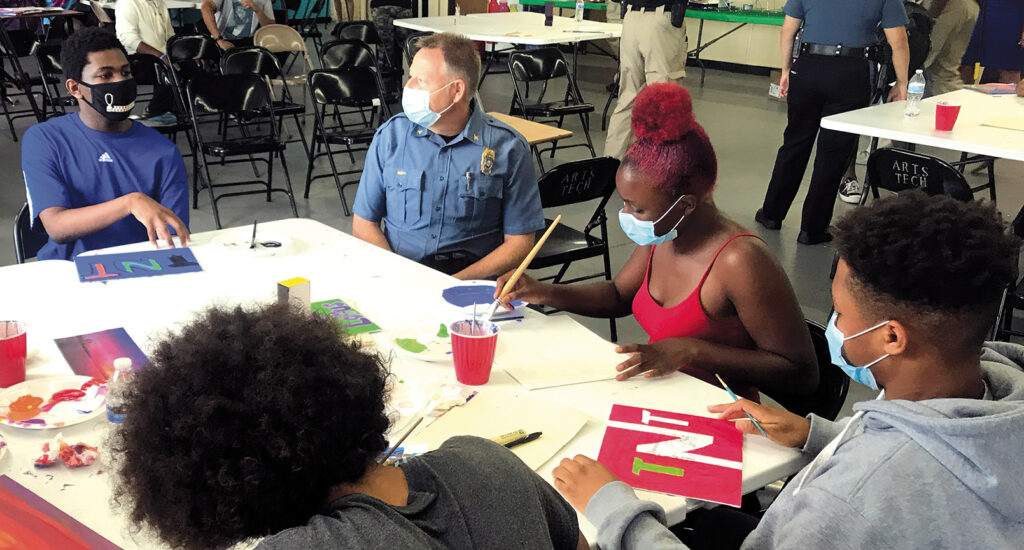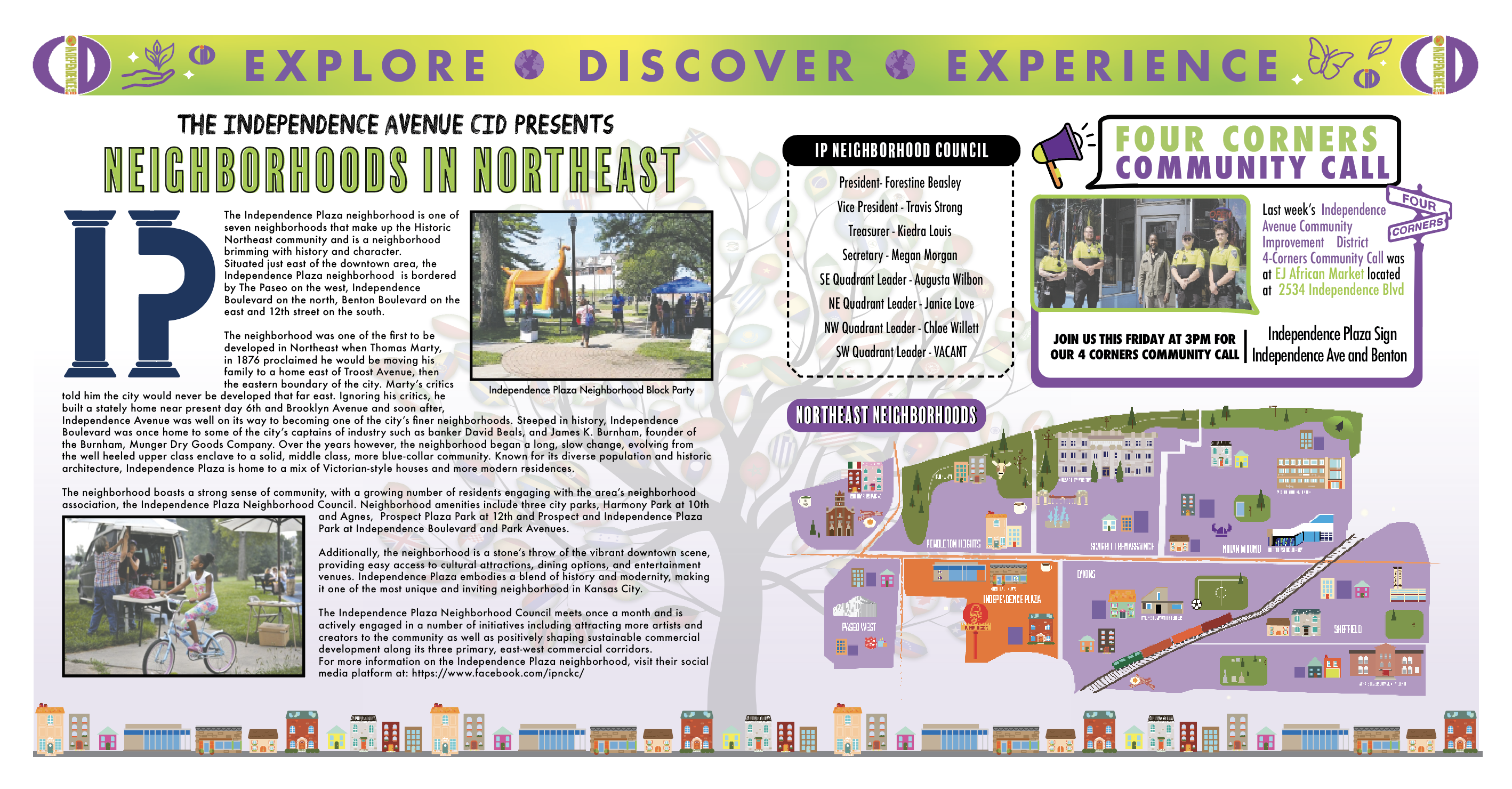
Abby Hoover
Managing Editor
With school buildings closed and unemployment rates up, students participating in the Teens in Transition (TNT) program are getting creative – and getting paid.
TNT is a partnership between Kansas City, Mo. Police Department (KCPD), Kansas City No Violence Alliance (NoVA) and local artists, which started in 2014.
Lead Artist for Teens in Transition (TNT) Michael Toombs has worked with officers in the program, which is funded through the mayor’s office, for eight years.
“The program was coined ‘Teens in Transition’ years ago when it was formed and the reason was because when the kids come in, they come in from very difficult circumstances and part of our goal as an organization and a team is to help them transition some of the difficulties that they go through in life and start preparing themselves for the opportunities to be able to have a job and earn a living,” Toombs said.
The program, which meets at ArtsTech (1522 Holmes St.), helps high schoolers find a creative outlet while building trust with School Resource Officers (SRO) from their schools.
“A few of the kids are from Northeast High School, a few are from Central, which would be two more SROs, and then Southeast High School, their two SROs are here and we have some kids from there, and then there are some kids from family court,” Northeast High School (NEHS) SRO Jamie Walk said.
With schools closed, SROs aren’t communicating with students in the usual way, but TNT provides space for that interaction.
“We think it’s really important because, first of all, we know the kids have been going crazy, probably sitting at home, nothing to do,” Walk said. “Summertime rolls around, this at least gives them something to do.”
Walk said it’s also a good time for students to make friends with kids from outside their neighborhood schools. He hopes the connections made and the trust built are carried into the classroom once school returns in person.
Working with professional artists helps students exercise their creativity.
“Sometimes these kids these days, focusing is not their best attribute,” Walk said. “Now they have a project they’re working with adults on, adult artists, us police officers. We’re all coming together for a panel of art.”
The program also provides tools for adulthood, a listening ear and an outlet for students’ questions.
Although the department is facing budget cuts due to COVID-19, KCPD has continued to allow SROs time to participate in programs such as TNT, which NEHS SRO Antonio Hill is grateful to see.
“We as police officers can learn a lot from these kids if we take the time just to listen, and that’s the majority of what they’re looking for is just somebody to listen to them and really show them that hey, there’s somebody out there who cares for you, even if you’re going through a hard time and whatever the case may be in your life that we’re here for you,” Hill said.
KCPD Chief Rick Smith said the program is a great example of the officers and the students working together, bringing back the one-on-one connection between youth and the police department.
“That’s what we do in this city every day, we try and build these relationships and work with people to reduce crime,” Smith said.
He has seen firsthand the change TNT makes in kids, and has noticed after completing the program, students’ contact with police drops dramatically.
“We also have other guest speakers come in,” Walk said. “We try to teach them about art, we try to teach them about job interviews, job skills, because the kids do get paid to be here.”
Students go through a hiring process to be selected for the program. They are expected to show up on time, and be presentable and professional, just like any other job. For some, it is their first paycheck or their first resume builder.
Toombs has seen the paycheck that is offered change students’ lives. Only two of the current students have had jobs before.
“It gives them something to look forward to, it gives them a positive incentive to work towards, helps them get over some of the barriers that sometimes get in the way and keeps us from being able to be successful,” Toombs said.
This year’s collaborative art project honors essential workers. While there is no permanent home for the project yet, a past work from the program hangs at East Patrol’s Crime Lab.
Toombs said as youth are sometimes not given the kind of instruction to know how to socialize within the normal environment, but SROs provide that foundation and prevent students from hindering the learning of their classmates.
“We’ve had young people here who have had negative interactions with the police department,” Toombs said. “One of the good things about this program is that they get a chance to see officers in a different environment, in a different purpose, and as a result some of the barriers they had up about these officers come down.”
Toombs said it also changes the perception officers have of the students, who they often only see in negative situations. This setting allows them to get to know each other in a different way.
“Not only are we working with our young people, we’re working with our officers that have to work with our young people, as well,” Toombs said.
Hill said the program helps students recognize that police officers are in their community to help them. While SROs do sometimes take students to jail, it is a very small percentage. Hill considers his role a preventative measure, rather than reactionary.
“Just by working in the Northeast area since I’ve been on, I’ve made good relationships with a lot of these kids,” Hill said.
One of those students is NEHS junior Siles Dunson. Hill knew his older siblings, and throughout the years, he has gotten to know Dunson’s parents and extended family.
“It’s given me great financial stability, helped me pay for my family, pay bills and such,” Dunson said. “The people here are amazing, the staff is awesome, very supportive. Toombs, the director, very nice person. Overall I think the program has really helped me.”
Dunson was interested in art before joining the program and prefers to doodle and draw a lot. He said he has not had a negative interaction with police and likes having Hill and Walk in his school.
Hill said there are a lot of parents who support the SROs and expect their children to be respectful.
“I love it, man, I love being a School Resource Officer at Northeast High School and just building relationships not only in the school, but outside,” Hill said.
NEHS junior Keith Bonds was not as interested in art when he started the program. He chose to spend his summer with TNT to meet new people and learn more about art.
“My dad did art, but every time I tried art I was kind of bad at it,” Bonds said.
Bonds has also never had a bad interaction with officers, and thinks having SROs in his school brings an extra level of security. However, his feelings are not as positive about virtual school starting back up in September.
“I kind of don’t like it because I want to go to the school, but at the same time I don’t want to get sick,” Bonds said. “I just want to get [high school] over with.”
There are no SROs in East High School, but due to budgetary constraints and officers already spread thin across their patrol zones, those positions are empty.
Hill said he wishes they could have the opportunity to build relationships with students at an earlier age. DARE Officers interact with elementary school students, but there is a gap in middle school where they often get off track.
“At some point when they get older, they will come in contact with a police officer, and there’s one thing that they can say: ‘I remember what my SRO said. Be respectful, be polite, and everything will be alright,’” Hill said.
The group of students changes each year, and Toombs said the majority of them go on to do much better than they did before the program.
ArtsTech is a youth development agency that uses art and technology to help youth develop life skills, work experience and community engagement. They also continue to supply other support and services to youth despite the pandemic.
“You’ve got to stay engaged with the kids,” Executive Director David Sullivan said. “I know it’s been hard for the past five, six months, but it’s going to be harder now. But the thing with the police chief, the mayor, when we were talking about this program, I said, ‘Who do you want supervising these kids, me or the streets?’ because they will be out there.”
Sullivan said for some families, the paycheck from TNT and ArtsTech’s workforce development programs was in some cases the only thing coming in during COVID-19 due to job loss.


















